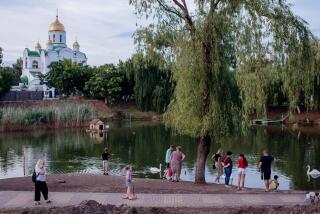6 Die in New Outbreak of Violence in Moldova : Soviet Union: Nationalist militia clashes with Russian separatists in three towns. Gorbachev sees the threat of ‘great trouble’ in the region.
- Share via
MOSCOW — Six people were killed and at least 30 more wounded Friday when armed Moldovan nationalists clashed with ethnic Russian residents of the southern Soviet republic of Moldova, the official Soviet news agency Tass reported.
The battle, fought with rifles, pistols and shotguns outside the town of Dubossary on the Dniester River, began after Russian-led separatists took over government offices there. Units of the new Moldovan volunteer militia marched on it and two other predominantly Russian towns to prevent the region’s secession from Moldova as the “Dniester Republic.”
In Moscow, Soviet President Mikhail S. Gorbachev described the developments as grave. Not only is the violence among the worst here in recent months, but it pits Russians against the local majority at a time when Russian nationalism is rising rapidly around the country.
“We are very alarmed by the situation in Moldova, where there is a great threat to peace and normal life,” Gorbachev said on Soviet television. “There are signs the situation might become badly aggravated, and then there might be great trouble.”
More battles--again, apparently between Moldovan “volunteers” and Russian residents--were also reported near Bendery, an important railway junction, and outside Tiraspol, an industrial center.
Reports from Tiraspol late Friday put the death toll as high as 10 and the wounded at more than 80, but there was no official confirmation of these figures.
A state of emergency was declared around three cities, Tass reported from Kishinev, the Moldovan capital, as brigades of “volunteers” moved into eastern Moldova to prevent the Russian separatists from organizing elections Sunday for an independent government for the region.
Local officials appealed to the central government in Moscow to send troops to intervene in the fighting.
Russian and Ukrainian residents had declared the eastern area to be the autonomous “Dniester Republic” in September, protesting what they felt were threats against them by Moldova’s Romanian-speaking majority, many of whom want to secede from the Soviet Union.
Moldova, formerly known as Moldavia, had declared its sovereignty from the Soviet Union. Moldovan nationalists had set the republican government on a course increasingly independent of Moscow--and worrisome to its ethnic minorities.
One of the smallest of the Soviet Union’s 15 constituent republics, Moldova consists largely of territory that the Soviet Union annexed from Romania during World War II to re-establish its borders along lines of the old Russian Empire. It has a population of 4.4 million, of whom about 2.8 million are Moldovans, 560,000 are Russians and 600,000 are Ukrainians.
The Russians’ separatist stand was strengthened last week when the Gagauzi, a Christian, Turkic-speaking minority of 153,000 in the southern corner of the republic, declared their autonomy, began elections for an independent government and were stopped with armed force.
Moldovan authorities had intervened in the Gagauz region, sending thousands of “volunteers” to prevent the elections. A series of skirmishes ensued between the Gagauzi, who were reportedly aided by Russians and Ukrainians, and the new Moldovan militia. No deaths were reported, and the Gagauz area was described as quiet Friday.
Gorbachev, speaking on Soviet television, made clear his support for the Moldovan government and the republic’s territorial unity.
“We will support the president (Moldova’s Mirca I. Snegur) . . . and the integrity of the republic,” he said. “The main thing now is to stop what is going on because clashes have already occurred. We should struggle against separatists of all kinds.”
Gorbachev said he will meet today with Pyotr Luchinsky, first secretary of the Moldovan Communist Party, to discuss the situation.
The clashes in eastern Moldova began after reports that elections for the “Dniester Republic,” which would effectively confirm its secession, had been brought forward from late November to Sunday. Alarmed, the Moldovan government rushed its new militia to the area to prevent the voting, Tass said.
Alexander Parajan, Dubossary’s deputy mayor, told Tass that local defense units were attempting to halt the “volunteers,” as the new militia is called, and that the police had intervened, apparently on the side of the militia.
“Moldovan police units are trying to break into the city,” Alexei Bulatovich, chief of the “Dniester Republic’s” workers’ defense units, told Tass by telephone from Dubossary. “They have opened fire and used truncheons and tear gas. The local police are not involved.”
Parajan said the fighting was continuing into the evening near the village of Lunga, outside Dubossary, as residents sought to defend the city, blocking bridges across the Dniester River. In Tiraspol, more than 2,000 workers were mobilized and armed and sent to assist residents of Dubossary, according to Tass.
In a different account, Mirca Druc, the Moldovan prime minister, told the republic’s legislature that a militia unit returning from duty in the Gagauz area had stopped in Dubossary and taken over government offices from separatists there to reassert republican authority. But then, he said, they encountered local opposition as thousands took to the streets and began to stone them.
More to Read
Sign up for Essential California
The most important California stories and recommendations in your inbox every morning.
You may occasionally receive promotional content from the Los Angeles Times.













